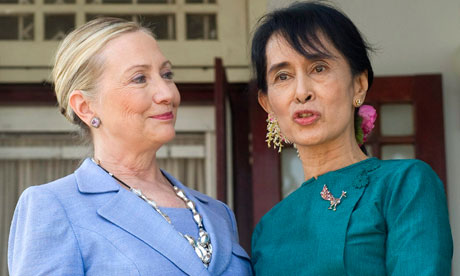Decision to permit protests and ceasefire with Shan rebels announced as US secretary of state concludes trip

Aung San Suu Kyi and US secretary of state Hillary Clinton talk to reporters at the Burmese pro-democracy leader’s Rangoon home . Photograph: Pool/Reuters
Burma has approved a new law permitting peaceful protest for the first time at the end of a high-profile visit by the US secretary of state, Hillary Clinton, the first by such a senior US government official in five decades.
The new law, signed by President Thein Sein and reported by Burmese state media, requires protesters to seek permission at least five days in advance.
Demonstrations of any kind were previously banned in the traditionally repressive nation, where authorities have cracked down hard on anti-government protests.
The loosening of the blanket ban on protest – which has yet to be tested – is the latest in a series of purported reforms enacted by Burma's "civilian" government – in reality made up of former senior military officials — since the military junta handed over power earlier this year.
State media also announced the government had agreed a ceasefire with the Shan State Army South, an armed ethnic group.
The announcements followed the conclusion of Clinton's three-day visit. The US secretary of state, who met pro-democracy leader Aung San Suu Kyi, had called for greater reform from a government accustomed to iron-fisted rule. She invoked the promise of a new era of relations with the US if the country delivered democratic change.
The Burmese government continues to hold hundreds of political prisoners and the country is still plagued by ethnic conflicts. The US maintains tight sanctions on senior leaders in Burma, which was ruled by a military junta from 1962 until 2010. Although the army handed power to a civilian government last year, military primacy is entrenched in the constitution.
"The United States wants to be a partner with Burma," Clinton said at Aung San Suu Kyi's home. "We want to work with you as you further democratisation, as you release all political prisoners, as you begin the difficult but necessary process of ending the ethnic conflicts that have gone on far too long, as you hold elections that are free, fair, and credible."
Despite the risk of giving legitimacy to a brutal military regime, the Obama administration sees Burma's democratic stirrings as a unique opportunity to champion democracy for almost 50 million people who have struggled under more than two decades of dictatorship. By reopening the discussions at such a high level, the administration also raised the chances of making inroads for US foreign policy in China's backyard.
Aung San Suu Kyi, whose party won elections in 1990 that were ignored by the then-military junta but who now plans to run in upcoming polls, endorsed that approach and called for the immediate release of all political prisoners and ceasefires to end the ethnic conflicts.
A heroine for pro-democracy advocates around the world, she said Clinton's visit represented "a historical moment for both our countries".
Clinton said after meeting Aung San Suu Kyi: "We have been inspired by her fearlessness in the face of intimidation and her serenity through decades of isolation, but most of all through her devotion to her country and to the freedom and dignity of her fellow citizens."
The US secretary of state said the two had discussed the "ups and downs and slings and arrows of political participation" at dinner, and that Aung San Suu Kyi would be an "excellent member" of Burma's parliament but declined to discuss any electoral advice she may have given her.
No comments:
Post a Comment